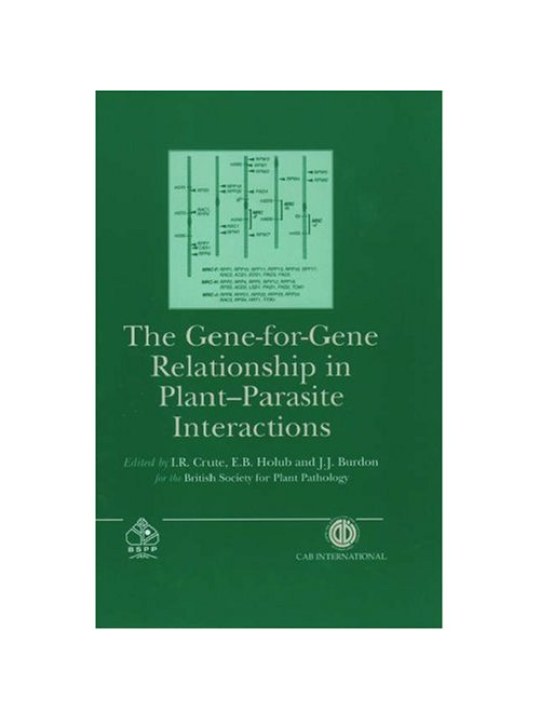The Gene-for-Gene Relationship in Plant-Parasite Interactions
Readership
Research workers in plant genetics, breeding, biotechnology and pathology.
Main Description
Genetics has transformed plant pathology on two occasions: first when Mendelian genetics enabled the discovery that disease resistance was a heritable trait in plants, and secondly when Flor proposed the “gene-for-gene” hypothesis to explain his observations of plant-parasite interactions, based on his work on flax rust in North Dakota starting in the 1930s. Our knowledge of the genetics of disease resistance and host-pathogen coevolution is now entering a new phase as a result of the cloning of the first resistance genes.
This book provides a broad review of recent developments in this important and expanding subject. Both agricultural and natural host-pathogen situations are addressed. While most of the book focuses on plant pathology, in the usual sense of the term embracing fungal, bacterial and viral pathogens, there is also consideration of parasitic plants and a chapter demonstrating lessons to be learnt from the mammalian immune system. Three overall themes are addressed: genetic analyses and utilization of resistance; population genetics; and cell biology and molecular genetics. Chapters are based on papers presented at the British Society for Plant Pathology Presidential meeting held in December 1995, but all have been revised and updated to mid-1996. Written by leading authorities from North America, Europe and Australia, the book represents an essential update for workers in plant genetics, breeding, biotechnology and pathology.
Main Contents
Contributors
Preface
Part One: Genetic Analyses and Utilization of Resistance
• Organization of Resistance Genes in Arabidopsis, E B Holub, Horticulture Research International, UK
• Genetic Fine Structure of Resistance Loci, S Hulbert, G Hu, T Richter, J Drake, Kansas State University, USA, and T Pryor, CSIRO, Australia
• Mutation Analysis for the Dissection of Resistance, P Schulze-Lefert, The Sainsbury Laboratory, Norwich, UK, C Peterhaensel and A Freialdenhoven, Rheinisch-Westfaelische Technische Hochschule Aachen, Germany
• Cultivar Mixtures in Intensive Agriculture, A C Newton, Scottish Crop Research Institute, Dundee, Scotland, UK
• Crop Resistance to Parasitic Plants, J A Lane, D V Child, G C Reiss, J A Bailey, Institute of Arable Crops Research, University of Bristol, UK, and V Entcheva, Institute of Wheat and Sunflower Research, Bulgaria
Part Two: Population Genetics
• The UK Cereal Pathogen Virulence Survey, R A Bayles, J D S Clarkson and S E Slater, National Institute of Agricultural Botany, Cambridge, UK
• Adaptation of Powdery Mildew Populations to Cereal Varieties in Relation to Durable and Non-durable Resistance J K M Brown, E M Foster and R B O’Hara, Cereals Research Department, Norwich, UK
• Virulence Dynamics and Genetics of Cereal Rust Populations in North America, J A Kolmer, Agriculture and Agri-Food Canada, Cereal Research Centre, Canada
• Interpreting Population Genetic Data with the Help of Genetic Linkage Maps U E Brδndle, U A Haemmerli, J M McDermott and M S Wolfe, Phytopathology Group, Swiss Federal Institute of Technology, Zόrich, Switzerland
• Modelling Virulence Dynamics of Airborne Plant Pathogens in Relation to Selection by Host Resistance in Agricultural Crops, M S Hovmψller, Danish Institute of Plant and Soil Science, Denmark, H Ψstergεrd, Plant Genetics, Risψ National Laboratory, Denmark and L Munk, The Royal Veterinary and Agricultural University, Denmark
• An Epidemiological Approach to Modelling the Dynamics of Gene-for-gene Interactions, M J Jeger, Wageningen Agricultural University, The Netherlands
• Modelling Gene Frequency Dynamics, K J Leonard, US Department of Agriculture, Agricultural Research Service, USA
• The Genetic Structure of Natural Pathosystems, D D Clarke, Division of Environmental and Evolutionary Biology, University of Glasgow, UK
• The Evolution of Gene-for-Gene Interactions in Natural Pathosystems, J J Burdon, CSIRO, Australia
Part Three: Cell Biology and Molecular Genetics
• Structural and Biochemical Characterization of Gene-for-Gene Interactions, J Mansfield, M Bennett, C Bestwick and A Woods-Tφr, Wye College, University of London, Kent, UK
• The Molecular Genetics of Specificity Determinants in Plant Pathogenic Bacteria, A Vivian, M J Gibbon, University of the West of England-Bristol, UK and J Murillo, Universidad Pϊblica de Navarra, Spain
• Molecular Characterization of Fungal Avirulence, W Knogge and C Marie, Max-Planck-Institut fόr Zόchtungsforschung, Germany
• The Molecular Genetics of Plant-Virus Interactions, N J Spence, Horticulture Research International, Warwick, UK
• Molecular Genetics of Disease Resistance: An End to the “Gene-for-Gene” Concept?, J Benyon, Wye College, Kent, UK
• Elicitor Generation and Receipt - The Mail Gets Through, But How?, N T Keen, University of California, USA
• Learning from the Mammalian Immune System in the Wake of The R-Gene Flood, J L Dangl, University of North Carolina, USA
• Genetic Disease Control in Plants - Where Now?, S P Briggs and R J Kemble, Pioneer Hi-Bred International, Johnston, USA
Index

